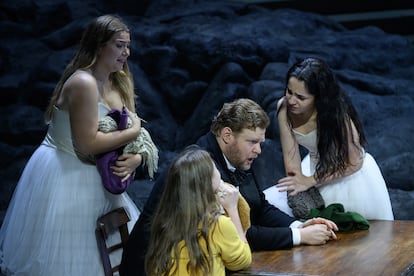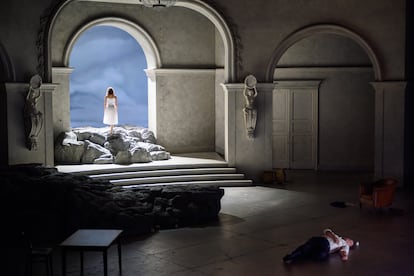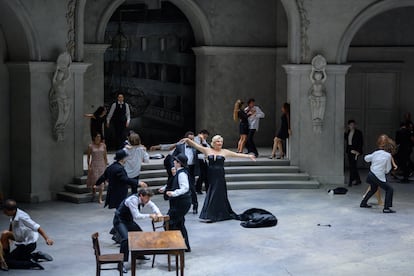In 1900, the Czech composer Antonín Dvořák faced the paradoxical challenge of silencing the protagonist of his opera Undine at the most significant moment of dramatic action. This was the result of baseing a part of your libretto on the story The Little Mermaidby Hans Christian Andersen, because the price that the unde must pay to become a woman is the loss of speech. One of the few precedents of something like this in the history of the opera is found in La Muda de Porticiby Daniel-François Auber, a pioneering title of the large opera French that today is remembered for its political impact on Brussels, in 1830, as a trigger for the Belgian revolution. In this title, the protagonist, the Neapolitan Fenella, is mute and must be interpreted by a dancer who is expressed only through mimicry and dance.
It is likely that the central idea of the stage director Christof Loy to turn Rusalka into a ballet dancer is related to this precedent. It is a co -production of the most important Opera of DVOřák that premiered at the Real Theater in Madrid in November 2020, in full decalsed, and that passed a year and a half ago by Les Arts of Valencia. Now it has served as a successful climax of the 24/25 season in the Liceu in Barcelona. Loy manages that idea with his usual brilliance to enhance the psychology of the characters. And blur the opposition posed by opera between the world of nature spirits to which Rusalka and the human world of the Prince belongs, in favor of a proposal in which the theater is metaphor and reality.
He manager German moves the action from a clearing of the forest to the banks of a lake to the lobby of a theater come less, although the scenery of Johannes Leiacker maintains some rocks in the middle of the scene. The aquatic nymph is presented as a disabled dancer inside a theater family, where the genius of the waters, Vodník, is the father figure and the witch Ježibaba, the maternal figure. In the second act, Prince’s castle moves to a living room with the theater boxes on the horizon. And, in the third, we return to the initial lobby, but now with a dead white deer in the place that occupied Rusalka’s bed, as a symbol of its tragedy, next to another additional rock that represents the prominence of nature at the end of the opera.
The best is reserved for the final scene with the powerful image of Rusalka heading towards the abyss. The Ondina has sacrificed the prince with her last kiss and we hear how the theme of her love in the rope is turned off, the reason for nature in the metal wind resurfaces and everything rises with the last harp of the harp. The burst of Bravos in the Liceu was clamorous last Saturday, June 28, after this memorable final scene of the opera, with the impressive protagonist duo of Asmik Grigorian and Piotr Beczała.

The Lithuanian soprano (Vilna, 44 years old) has found in the role of Rusalk a vocal and scenic ideal. It combines dramatic force with lyrical subtlety and its ability to embody the character’s ethereal and earthly duality is exceptional. Grigorian “sings” with his body in the part of the opera in which he is mute, with intense facial expressions and accurate ballet tips. Vocally, he exhibited an exquisite moderation in the popular Moon Songin the first act, and raised especially Youth of your involved (Private of my youth), at the beginning of the third, which flooded with nuances with the fair dose of metal so as not to lose an apex of flexibility in its interpretation.
The Polish tenor (Czechowice-Dziedzice, 58 years old) dazzled as the prince, the most demanding role of the entire opera, already from the final scene of the first act. With his beautiful achocolatado tone, he boosted the final bars and won the dense orchestration of Dvořák. But the best of his performance, and of the entire opera, came in the aforementioned duet/final dialog do not scream to prevent the singer’s cry). But the musicality that demonstrated in its final phrase Kiss me, kiss, peace for me! (Abrak me, offer me peace!) In the middle of a voice and with an ascent to the si double Bemol Overgudo in Piano very memorable.
The young Greek Aleksandros Stavrakakis was a revelation in the role of Vodník. With his voluminous, virile and well -nuanced voice, he was able to give life to the two dimensions of the genius of the waters: the compassionate tenderness and the cavernous authority. He turned his Aryan The whole world will not give you, it will not give you (The whole world will not give you) in the best of the second act. The mezzo-soprano German Okka von der Damerau was a solid Witch Ježibaba, who demonstrated in the acute during the preparation of concoction in the first act. In the rest, his voice sounded more rigid, unlike his brilliant scenic performance. For its part, the Finnish soprano veteran Karita Mattila returned to life, as in Madrid, to a haughty and despicable foreign princess in the second act, with the limitations imposed by age to her instrument, but also with an undoubted vocal delivery, because she did not skimp the overgrowth, a note to which the character of Rusalka does not reach.

Among the secondary ones, the couple formed by Barítone Baritón Manell Esteve and the mezzo-soprano Madrid Laura Orueta, who played the Hajny rangers and her nephew the transvestite Kuchtík cooking click, respectively. Both were magnificent at the beginning of the second act, contributing the folk touch of the Czech comic opera that Loy leads to the world of silent cinema around a ladder. The two had a lot of acting work as figures, as well as the Madrid baritone David Oller, in the role of the Lovec Hunter. We cannot forget the excellent trio of nymphs (here dancers), where the soprano Armenia Julietta Aleksanyan highlighted in his alone of the third act in front of the mezzosopranos Laura Fleur and Alyona Abramova. And a mention of the good performance of the Choir of the Great Teatre of the Liceu, although all its interventions were sang between racks.
The musical direction of Josep Pons was another of the struts of this successful season closure in the Liceu. At the head of a motivated orchestra of the house, he got a dramatically fluid version, with flashes of the Czech native charism. His direction lost some interest in the second act, which is also the least achieved of the scenic direction of Loy, with one of his characteristic ballets marked by erotic debauchery. But he compensated it with a third memorable act, perfectly propelled from beginning to end and that was the best heard this season in the Liceu. This production was going to be the last of the Catalan director as head of the Opera Theater of Las Ramblas, but it will continue another season until July 2026.

